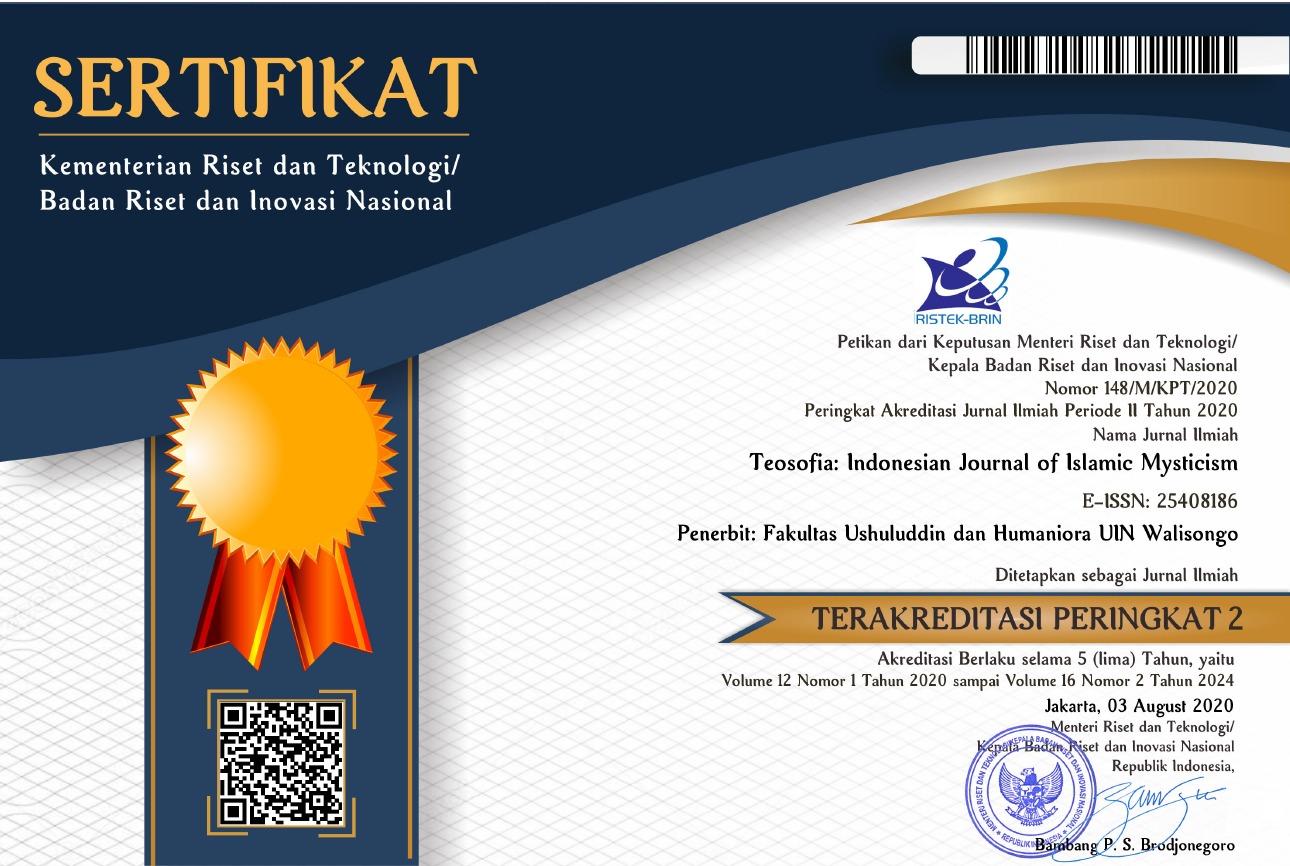Eco-Sufism in the Light of the Qur’ān: A Thematic Study of Tafsir Al-Misbah by Muhammad Quraish Shihab
DOI:
https://doi.org/10.21580/tos.v12i1.17844Keywords:
eco-sufism, environmental conservation, Tafsir Al-MisbahAbstract
The concept of Eco-Sufism, as an environmental ethic, believes that nature is the tajalliyāt and image of asmā and the attributes of God, all of which have theological and humanist sensibilities. The Qur’ān confirms this view, stating that all nature surrenders (aslama), submits to God’s laws (qāniṭūn), purifies (sabbaḥa), prostrates (yasjudu) and prays (ṣalāt). This library research focuses on analysing Tafsir Al-Mishbah by Muhammad Quraish Shihab as a primary source. The content analysis approach is used to uncover the mufassir’s views on Eco-Sufism in his tafsir. In contrast, the mauḍūʿi (thematic) method is applied to explore the concept of Eco-Sufism in the Qur’ān. The results showed that the religiosity of the universe expressed through paradigmatic dialectics and Eco-Sufism terms can be understood as a form of the universe’s submission to the system established by Allah the Almighty. The universe’s harmony, aptitude and discernment are clues to the Power and Oneness of the Creator. However, various natural activities such as tasbīḥ, sujūd, and ṣalāt are variously interpreted as majāzi or ḥaqīqī. However, the servitude of nature expressed through the activity of the universe is proof that nature also has a soul and spiritual dimension, just like humans.
Contribution: This paper theoretically provides a holistic view of Sufism in building an ideal relationship among humans, God and the environment, which is expected to produce pragmatic results for the rescue and protection of nature and the environment.
Downloads
References
Achmad, Bahrudin. Tasawuf Dan Thariqah: Menuju Manusia Rohani. Bekasi: Pustaka Al-Muqsith, 2020.
Al-Fairuzabadi, Majduddin Muhammad Ibn Ya’qub. Bashair Dzawi At-Tamyiz Fi Lathaif Al-Kitab Al-‘Aziz. Vol. 3. Cairo: Majelis Al-A’la li Syu’un Al-Islamiyah, 2009.
Al-Fasi, Abu Al-‘Abbas Ahmad Zarruq. Qawâ’id At-Tashawwuf Wa Syawâhid At-Ta’arruf. 2nd ed. Beirut: Dar Al-Kutub ‘Ilmiyah, 2005.
Al-Ishfahani, Ar-Raghib. Mufradat Al-Fadz Al-Qur’an. 4th ed. Damaskus: Dar Al-Qalam, 2009.
Ali, Atabik, and Ahmad Zuhdi Muhdlor. Kamus Kontemporer Arab-Indonesia. 8th ed. Yogyakarta: Multi Karya Grafika, 1998.
Amin, Mochammad Lathif. “Eko-Sufisme Islam Aboge Masjid Saka Tunggal Cikakak Banyumas.” JURNAL PENELITIAN 14, no. 2 (December 21, 2017): 131–50. https://doi.org/10.28918/jupe.v14i2.969.
Assya’bani, Ridhatullah, and Ahmad Syadzali. “Pandangan Ulama Balangan Tentang Pengelolaan Sumber Daya Alam Batubara Di Balangan Dalam Perspektif Eko-Sufisme.” Jurnal Studia Insania 2, no. 1 (April 30, 2014): 59–77. https://doi.org/10.18592/jsi.v2i1.1092.
Asy-Syafi’i, Husain Muhammad Fahmi. Ad-Dalil Al-Mufahras Li Al-Fadz Al-Qur’an Al-Karim. 3rd ed. Cairo: Dar As-Salam, 2008.
At-Taftazani, Abul Wafa Al-Ghanimi. Madkhal Ila At-Tashawwuf Al-Islami. 3rd ed. Cairo: Dar Ats-Tsaqafah li Ath-Thaba’ah wa An-Nasyr, 1979.
Badawi, Elsaid M., and Muhammad Abdel Haleem. Arabic-English Dictionary of Qur’anic Usage. Leiden: Brill, 2008.
Bowman, William, Sally Hacker, and Michael L. Cain. Ecology. 4th ed. Sunderland: Sinauer Associates, 2017.
Collin, Peter Hodgson. Dictionary of Environment and Ecology. 5th ed. London: Bloomsbury Publishing Plc, 2004.
Departemen Pendidikan Nasional. Kamus Bahasa Indonesia. Jakarta: Gramedia Pustaka Utama, 2008.
Evanoff, Richard. “Reconciling Self, Society, and Nature in Environmental Ethics.” Capitalism Nature Socialism 16, no. 3 (September 2005): 107–14. https://doi.org/10.1080/10455750500208839.
Febriani, Nur Arfiyah. “Ekosufisme Berwawasan Gender Dalam Al-Qur’an.” Musãwa Jurnal Studi Gender Dan Islam 16, no. 1 (April 23, 2017): 127–52. https://doi.org/10.14421/musawa.2017.161.127-152.
Ibn Mandzur, Abu Al-Fadhl Jamaluddin Muhammad. Lisan Al-‘Arab. Vol. 4. Cairo: Dar Al-Hadis, 2013.
Imamah, Fardan Mahmudatul. “Menghadapi Kapitalisme: Pendekatan Eco-Sufism Dalam Gerakan Environmentalisme Islam Indonesia.” Kontemplasi: Jurnal Ilmu-Ilmu Ushuluddin 5, no. 1 (June 9, 2017): 109–35. https://doi.org/10.21274/kontem.2017.5.1.109-135.
Jauhari, Thanthawi. Al-Jawâhir Fi At-Tafsîr Al-Qur’an Al-Karîm. Vol. 1. Cairo: Musthafa Al-Halaby, n.d.
Laila, Nur. “Ekosufisme Majelis Zikir Kraton Habib Muhamad Dardanylla Shahab Pekalongan.” Religia 21, no. 1 (April 25, 2018): 67–77. https://doi.org/10.28918/religia.v21i1.1500.
Mahmoud, Abdul Halim. Qadliyah At-Tashawwuf: Al-Munqidz Min Adl-Dlalal. 6th ed. Cairo: Dar Al-Ma’arif, 2008.
Moleong, Lexi J. Metodologi Penelitian Kualitatif. 8th ed. Bandung: Rosda Karya, 1997.
Molles, Manuel C., and James F. Cahill. Ecology: Concepts and Applications. 8th ed. New York: McGraw-Hill Education, 2019.
Muhammad, Khaththar. Al-Mausû’ah Al-Yusûfiyyah Fi Bayâni Adillati Ash-Shûfiyyah. Damaskus: Dar At-Taqwa, 2012.
Mulyadi Kartanegara. Lentera Kehidupan: Panduan Memahami Tuhan, Alam Dan Manusia. 1st ed. Bandung: Mizan, 2017.
Nasr, Sayyed Hossein. Knowledge and The Sacred. New York: Crossroad Publishing Company, 1998.
———. Man and Nature: The Spiritual Crisis of Modern Man. London: George Allan and Udwin, 1968.
———. Religion and the Order of Nature. New York: Oxford University Press, 1996.
Nasr, Seyyed Hossein. Islam and the Plight of Modern Man. Vol. 4. London; New York: Longman, 1975.
Ns, Suwito. “Pola Konsumsi Dalam Islam Dan Konsep Eco-Sufisme Muhammad Zuhri.” Ibda’ Jurnal Kebudayaan 9, no. 1 (2011): 71–88.
NS, Suwito. Eko-Sufisme: Konsep, Strategi, Dan Dampak. 2nd ed. Purwokerto: STAIN Press Purwokerto, 2011.
Rofiq, Ahmad Zainur. “Penanggulangan Sampah Non Organik (Plastik) Dalam Perspektif Eko-Sufisme.” An-Nahdlah 6, no. 1 (2019): 84–94. https://journal.stitjembrana.ac.id/index.php/An-Nahdlah/article/view/31.
Rouf, Abdul. Mozaik Tafsir Indonesia; Kajian Ensiklopedis. Depok: Sahifa Publishing, 2020.
Scattolin, Giuseppe, and Ahmad Hasan Anwar. At-Tajalliyât Ar-Rûhiyyah Fi Al-Islam: Nushâsh Shâfiyyah ‘Abr At-Tarîkh. Cairo: Al-Haiah Al-Mishriyah Al-‘Ammah li Al-Kitab, 2012.
Shihab, M. Quraish. Tafsir Al-Misbah; Pesan, Kesan Dan Keserasian Al-Qur’an. Vol. 15. Jakarta: Lentera Hati, 2012.
———. Tafsir Al-Misbah; Pesan, Kesan Dan Keserasian Al-Qur’an. Vol. 1. Jakarta: Lentera Hati, 2012.
Smith, Thomas M., and Robert Leo Smith. Elements of Ecology. 9th ed. England: Pearson Education Limited, 2015.
Sudarsono. Menuju Kemapanan Lingkungan Hidup Regional Jawa. Yogyakarta: PPLHRJ, 2007.
Sulaiman, As-Sayyid Isma’il ‘Ali. Fawatih Suwar Al-Qur’an Al-Karim: Anwa’uha Wa Dilalatuha. Cairo: Maktabah Al-Iman, 2010.
Syarif, Laode M., and Andri G. Wibisana, eds. Hukum Lingkungan: Teori, Legislasi Dan Studi Kasus. Jakarta: The Asia Foundation, 2000.
Taufiq, Thiyas Tono. “Kearifan Lingkungan Berbasis Agama (Studi Etnoekologi Komunitas Nelayan Di Pesisir Banyutowo Dukuhseti Pati).” Jurnal Ilmiah Sosiologi Agama Dan Perubahan Sosial 11, no. 2 (2017): 259–80. https://doi.org/10.14421/jsa.2017.112-07.
Downloads
Published
How to Cite
Issue
Section
License
Copyright
The copyright of the received article shall be assigned to the journal as the publisher of the journal. The intended copyright includes the right to publish the article in various forms (including reprints). The journal maintains the publishing rights to the published articles. Therefore, the author must submit a statement of the Copyright Transfer Agreement.*)
Licensing

This work is licensed under a Creative Commons Attribution-ShareAlike 4.0 International License.
In line with the license, authors are allowed to share and adapt the material. In addition, the material must be given appropriate credit, provided with a link to the license, and indicated if changes were made. If authors remix, transform or build upon the material, authors must distribute their contributions under the same license as the original.
_______
*) Authors whose articles are accepted for publication will receive confirmation via email and send a Copyright Transfer Agreement.








